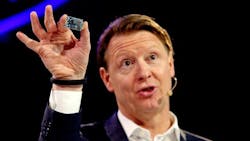Ericsson AB ousted CEO Hans Vestberg, after revenue and profit sagged and an array of investigations at the Swedish maker of wireless-networking equipment led to growing shareholder unease.
Vestberg, who was CEO for 6-1/2 years, stepped down immediately, according to an Ericsson statement Monday. Chief Financial Officer Jan Frykhammar will be CEO until a replacement is found.
“In the current environment and as the company accelerates its strategy execution, the board of directors has decided that the time is right for a new leader to drive the next phase in Ericsson’s development,” the company said.
Vestberg’s departure caps a turbulent period for Ericsson, which is cutting jobs while battling fierce competition from Huawei Technologies Co. and Nokia Oyj. The company said last week it would accelerate cost cuts after reporting four straight quarters of disappointing revenue and profit. Vestberg has faced questions on probes into alleged corruption in Asia and Europe, and last week the company rejected a report in Swedish media that it may be inflating sales by booking revenue before some clients are invoiced.
Ericsson advanced as much as 5.9% on the news. The stock was up 2.4% to 64.95 kronor ($7.51) at 12:51 p.m. in Stockholm. The shares lost about 4% during Vestberg’s tenure, compared with a more than 90% gain for the Stoxx 600 technology index in the period.
The board’s decision was unanimous, Chairman Leif Johansson said in an interview: “This was a discussion that has developed over the past couple of weeks so therefore there was no element of surprise. We took the initiative to separate.”
With much of the so-called fourth-generation networks already built in the U.S. and China, Vestberg had vowed to improve profitability, but the stock has declined since reaching a more than seven-year high in April last year.
Vestberg had carved out new business units targeting media and enterprise customers to get back to growth, while investing in a next generation of so-called 5G wireless technology, which represents the next wave of spending at Ericsson’s telecom carrier customers. However, he refrained from big, dramatic moves like Nokia’s purchase of Alcatel-Lucent SA, opting instead for a partnership with Cisco Systems Inc. for Internet products like routers.
A new CEO could potentially shift the product strategy and be more aggressive about mergers and acquisitions, Sébastien Sztabowicz, an analyst with Kepler Cheuvreux, said in a research note. Nokia and Huawei “have both engaged toward an end-to-end products portfolio strategy,” he said.
Vestberg, a career Ericsson manager who joined the company straight out of business school in 1991, headed its global service division from 2003 to 2007 after having held various positions for the company in China, Sweden, Chile and Brazil. He was named chief financial officer in October of 2007 and replaced Carl-Henric Svanberg as CEO at the start of 2010.
Earlier this year, Ericsson’s second-biggest shareholder, Industrivaerden AB, was unusually candid in its critique of the mobile-network manufacturer, saying its shares had underperformed in the face of market changes.
Ericsson said in June it was cooperating with U.S. authorities since receiving a March 2013 request to provide information on its operations, and that it is working “diligently” to answer the questions. The questions pertain to the company’s anti-corruption program and the U.S. Foreign Corrupt Practices Act. The company also said that month that seven current and former employees were summoned by a Greek prosecutor investigating allegations of possible corruption in the 1999 sale of an airborne radar system used in defense.
In June, Swedish newspaper Svenska Dagbladet reported that the Securities and Exchange Commission and the U.S. Department of Justice are investigating Ericsson for suspected corruption, including at its operations in China.
Through vote-heavy A shares, Industrivaerden and its associate Svenska Handelsbanken AB control more than 42% of the votes in Ericsson together with largest shareholder Investor AB, the holding company of Sweden’s Wallenberg family.
“They needed something to happen,” said Mathias Lundberg, an analyst at Swedbank AB in Stockholm.
By Kim Robert McLaughlin, with assistance from Kasper Viita and Anna Molin
About the Author
Bloomberg
Licensed content from Bloomberg, copyright 2016.
